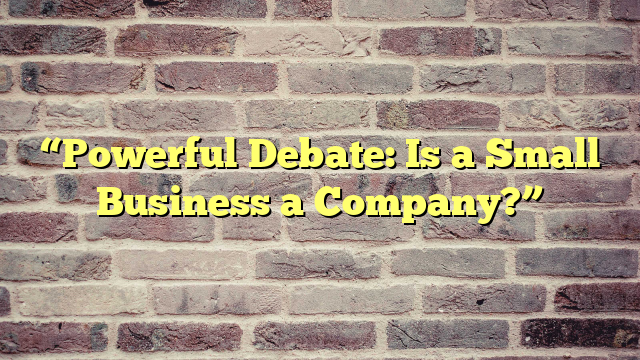Title: Powerful Debate: Is a Small Business a Company?
Introduction
In today’s competitive business world, the terms “small business” and “company” are often used interchangeably. However, there is a long-standing debate about whether a small business can be considered a company. Some argue that a small business is just a scaled-down version of a larger company, while others believe that there are distinct differences between the two. In this article, we will delve into the powerful debate of whether a small business can truly be called a company.
Subheading 1: Defining Small Business and Company
Before we dive into the debate, it is essential to define what exactly a small business and a company are. A small business is typically defined as an independently owned and operated company that has a limited number of employees and generates relatively low revenue. On the other hand, a company is a legal entity that is formed to engage in business activities, and it can range from a small startup to a large multinational corporation.
Subheading 2: Size and Scale
One of the main differences between a small business and a company lies in their size and scale. Small businesses are usually characterized by having fewer employees, smaller revenue, and a limited geographic reach. They often operate on a smaller budget and cater to a specific niche market. On the other hand, companies tend to have a more extensive reach, with more employees, higher revenues, and a wider range of products or services. They also have the potential to expand globally and have a more significant impact on the economy.
Subheading 3: Legal Structure
Another key difference between a small business and a company is their legal structure. Small businesses are usually sole proprietorships, partnerships, or LLCs (limited liability companies). These structures offer more flexibility and are relatively easy and cost-effective to set up. In contrast, companies are typically formed as corporations, which are separate legal entities with their own rights and obligations. This structure provides more protection to the owners and shareholders but involves more legal formalities and higher costs.
Subheading 4: Management and Decision-making
The management and decision-making processes in small businesses and companies also differ significantly. In a small business, the owner or a small team of managers usually makes all the decisions. The decision-making process is relatively informal and can be influenced by personal relationships and preferences. In contrast, companies have a more hierarchical structure, with a board of directors and executive team responsible for making decisions. These decisions are based on data and analysis rather than personal relationships, making the process more formal and structured.
Subheading 5: Financial Resources
The availability of financial resources is another factor that sets small businesses apart from companies. Small businesses often rely on personal savings, loans, or investments from family and friends to fund their operations. They also tend to have limited access to external funding sources such as venture capital or bank loans. On the other hand, companies have more significant financial resources at their disposal and can raise capital through various means, such as issuing stocks or bonds.
Subheading 6: Growth and Expansion
One of the main goals of any business is to grow and expand. Small businesses and companies have different approaches to achieving this goal. Small businesses usually focus on steady and sustainable growth, often within their local or niche market. They may also expand through franchising or licensing their products or services. In contrast, companies have a more aggressive growth strategy, often aiming to expand globally and increase their market share. They may also use mergers and acquisitions to grow and diversify their business.
Subheading 7: Impact on the Economy and Society
When it comes to the impact on the economy and society, both small businesses and companies play crucial roles. Small businesses are the backbone of the economy, providing employment opportunities and contributing to the local community. They also foster innovation and entrepreneurship, driving economic growth. On the other hand, companies have a more significant impact on the economy and society due to their scale and resources. They often create jobs on a larger scale, and their actions can have far-reaching consequences, both positive and negative.
Conclusion
In conclusion, while there are some similarities between small businesses and companies, there are also significant differences that set them apart. The debate about whether a small business is a company will likely continue, as there is no clear-cut answer. Both small businesses and companies have their unique characteristics and play critical roles in the business world and society. Whether it is a small business or a company, what matters most is their ability to thrive and contribute to the economy and society.

